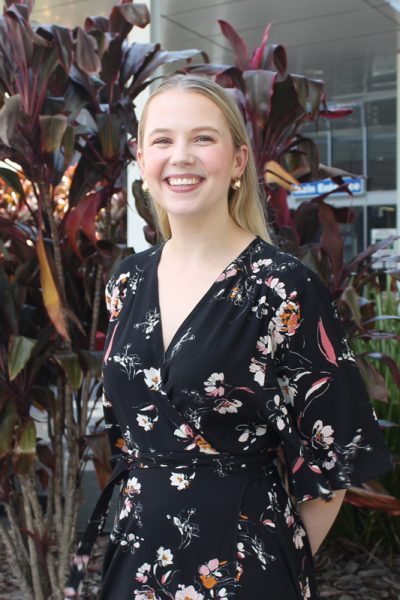Community dysphagia research highlights telehealth importance
The use of telepractice in the community care setting is having positive outcomes to service delivery, efficiencies and the quality of care being provided to dysphagia patients.

Speech pathologist Chloe Smith’s research project looks at implementing telehealth into dysphagia assessments in the home.
Community and Oral Health speech pathologist Chloe Smith said since the establishment of a telepractice dysphagia assessment model within a community setting, there have been positive client outcomes and service efficiencies.
“Telepractice is a widely used and accepted treatment model for speech pathology, but previous research has centred around facility-based models as opposed to a community health setting,” Chloe said.
“At Community and Oral Health we undertook an initial research trial to understand the feasibility of how telepractice for dysphagia assessments would work in home delivered services.
“This study was followed by the rollout in mid-to-late 2023 of a second trial to identify and address the barriers to ensuring sustainability of the model in a couple of services.”
The trials, which included the Community Transition Care Program and Complex Chronic Disease Team, involved a speech pathologist conducting a patient swallowing assessment via telepractice with the support of a trained clinical assistant.
“The clinical assistant would go to the patient’s home, set up the telehealth connection and clinical equipment, and support the Speech Pathologist who would remotely oversee the swallow assessment,” Chloe said.
Importantly, the telepractice model of care was designed to provide the right care at the right time and supplement but not replace in-person assessments. Model suitability was assessed on a client-by-client and session-by session basis.
Chloe said the trials saw significant time savings for speech pathologists especially in the Community Transition Care Program, and a high level of patient and staff satisfaction.
“Through the elimination of travel the speech pathologist would on average save around 56 minutes for a telepractice dysphagia assessment,” she said.
“In this case the burden of travel was not eliminated but rather redistributed to the clinical assistant, however the time saved for the speech pathologist enabled them to reinvest into additional clinical interventions and higher-value activities.”
With the trials showing a high level of success, further work will be undertaken in other community-based services to explore the feasibility of the model.
The dysphagia research was coordinated by speech pathologist Chloe Smith and advanced speech pathologist Dr Clare Burns.
